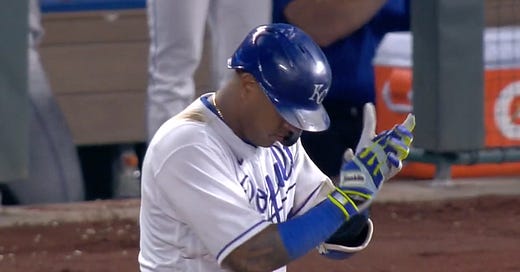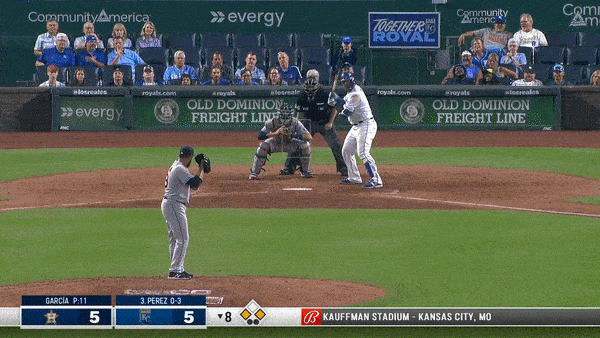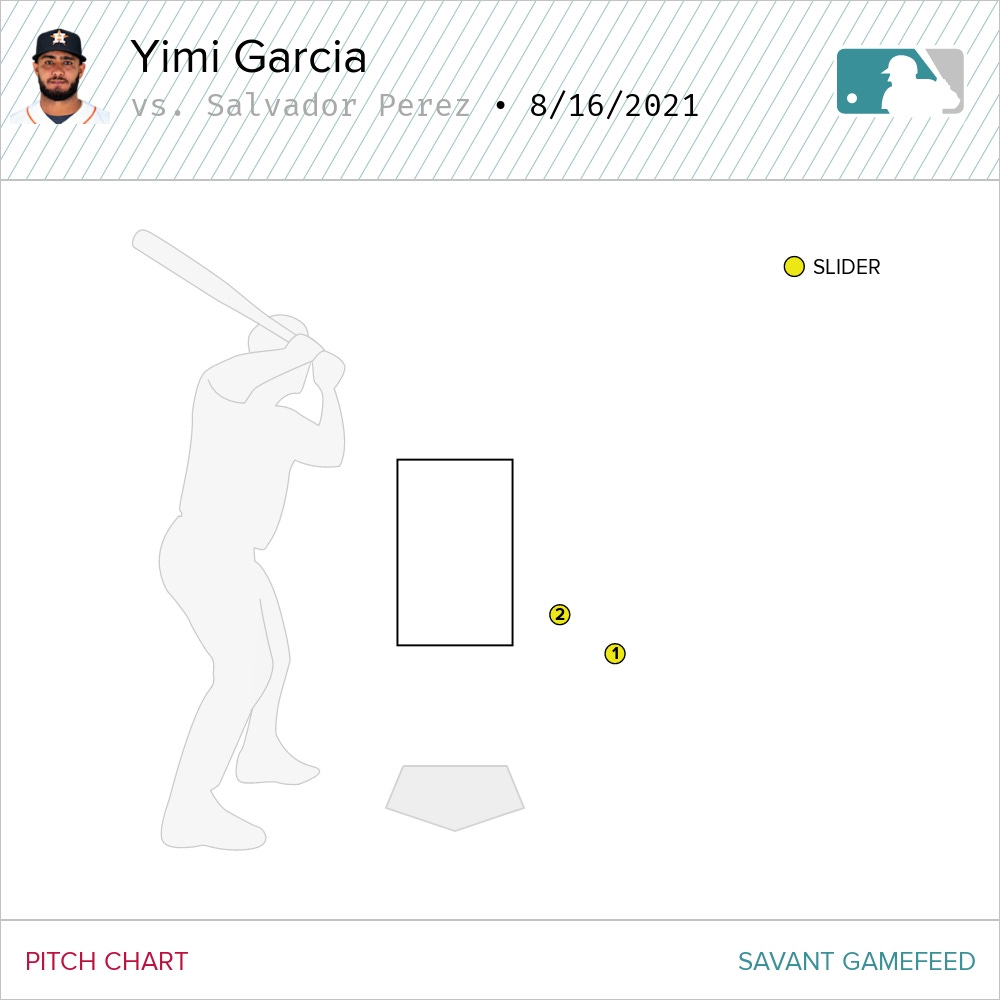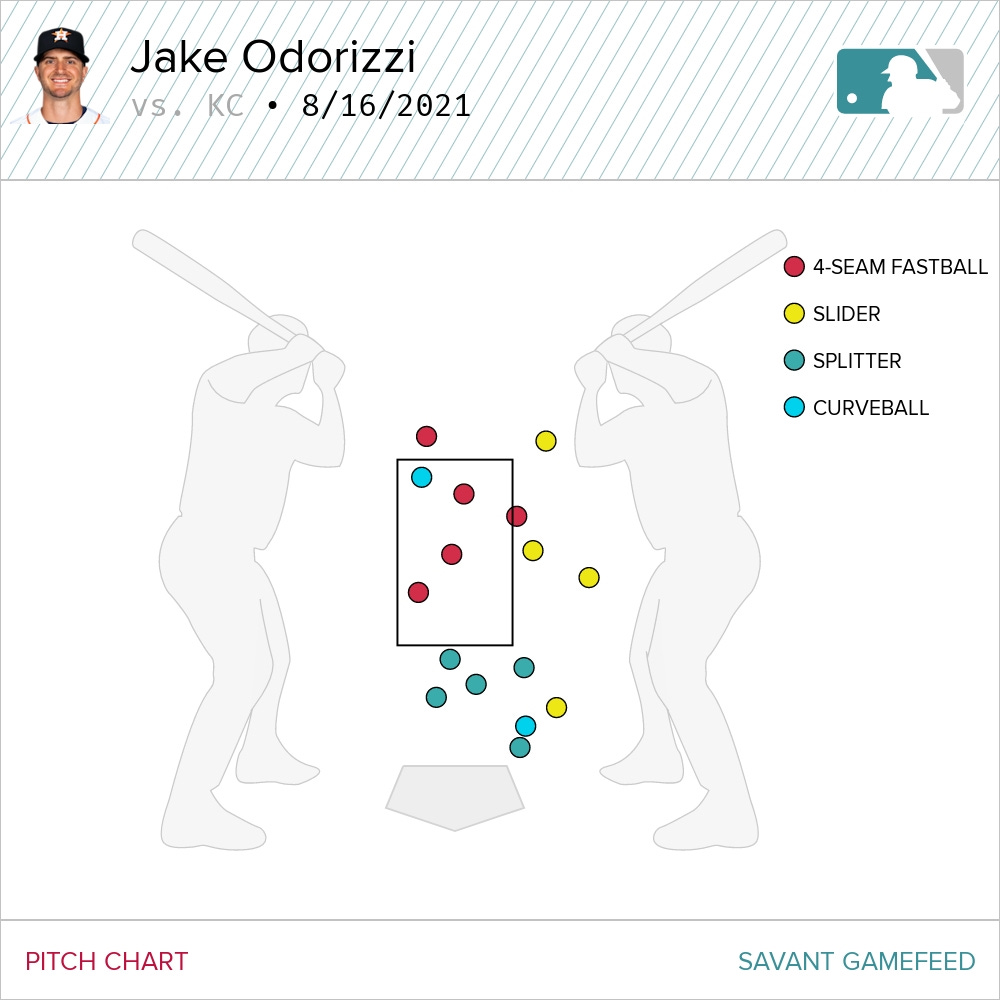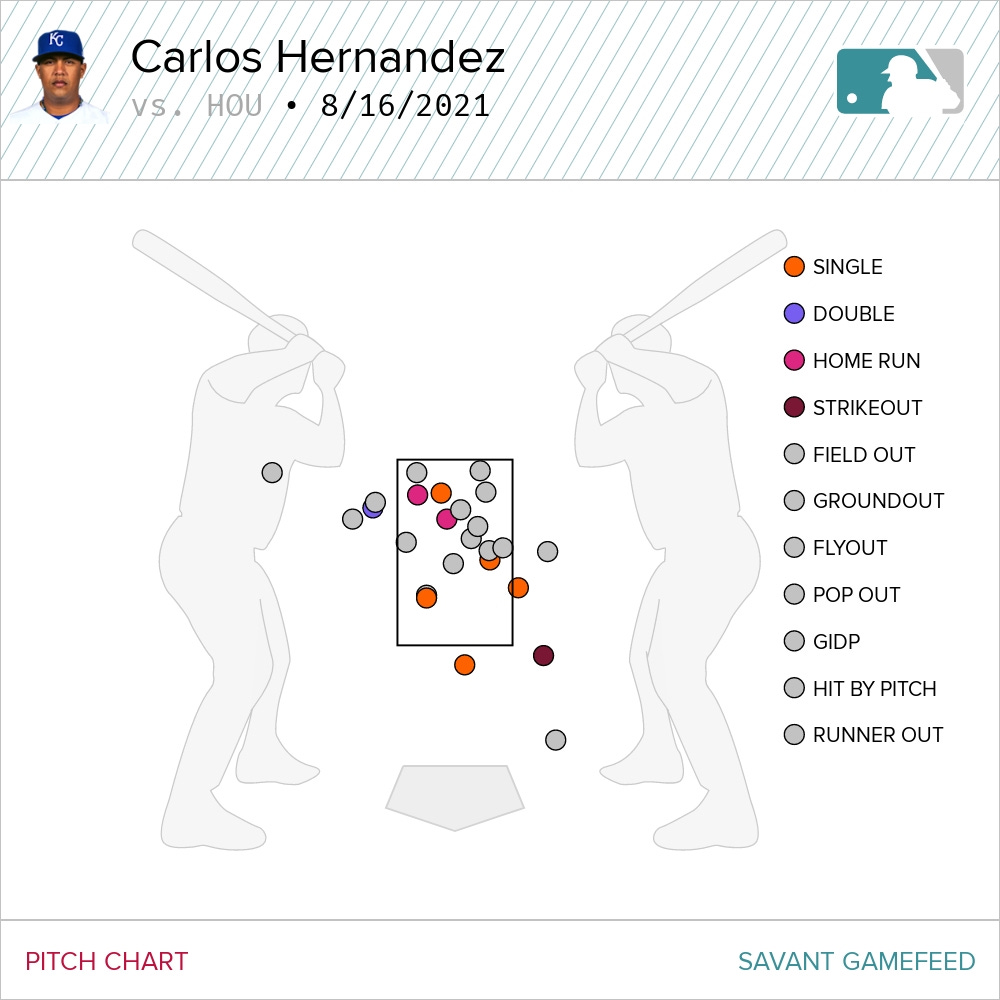Mr. Clutch
After a frustrating start, the offense comes alive. And yes, it was that man Salvador Perez, once again saving the day for the Royals.
You kind of have to hand it to the Royals. After a lifeless three-game series against the Cardinals over the weekend, they showed on Monday they are still capable of playing some damn entertaining baseball. Against the Houston Astros, they coughed up a pair of leads before storming back and prevailing late by a final of 7-6.
It was a complete offensive show. The kind that makes it fun to watch a ballgame. Almost everyone was involved.
Whit Merrifield collected three hits, including one with two outs in the eighth to ignite the winning rally.
Nicky Lopez swiped three bags, including two in the seventh before scoring the go-ahead run on a Carlos Santana single.
Speaking of Santana, he was on base three times courtesy of two hits and a walk.
Ryan O’Hearn drove home two of the first three Royals runs of the game on a double and a single.
Hunter Dozier hit a game-tying home run in the sixth, his first in 100 at bats.
And then there was Mr. Clutch, Salvador Perez. More on him in a moment.
Whew. What a night. What a victory.
I’ve found myself reflecting quite a bit the last several weeks, mentally dropping certain games back into those championship seasons and thinking, “Damn, it would’ve been especially electric if the Royals were in a pennant race.” This was one of those games where the stadium would’ve been packed with 30,000-plus delirious fans. Ahhh…what could be.
What else can you do, Salvador Perez?
The above question was posed by Steve Physioc as the liner off of Perez’s bat at 75.7 mph gently dropped down the right field line to bring in the go-ahead runs in the eighth inning. Honestly, it’s a valid question.
The whole rally was ninja-like in its speed, stealth and complete victory. Astro reliever Yimi García was absolutely dominant in blowing away the first two batters of the inning, getting both Dozier and Emmanual Rivera to go down swinging.
Merrifield started the action by going the opposite way on an elevated curve. The Royals’ broadcasts this summer have been riding that opposite field bandwagon far too much for my liking, but in this case, it was justified. Merrifield needed to get on base. He saw a first-pitch slider off the outer edge called for a strike.
This is where the wheels start spinning. García, who was the closer in Miami before being shipped to Houston just ahead of the trade deadline, will generally feature four pitches at times out of the bullpen: A fastball that on Monday was riding in the mid-90s, a slider that clocks in at around 90 mph, a curve and a change.
Ahead in the count 0-1, Merrifield was looking for something hard, but adjusted to the high curve that didn’t feature a lot of bend. It was just a professional piece of hitting.
Lopez was next. Like Merrifield, he knew he needed to get on base to keep the inning alive. He jumped on a first-pitch curve to ground back up the middle for another single.
With runners on the corners, Lopez decided to take a chance and break for second on the first pitch to Perez. It was a slider well off the plate, a great pitch to run on regardless, but it was a stroll to second when catcher Jason Castro couldn’t get a handle on the ball to make the throw. It was, as noted above, Lopez’s third steal of the game.
At this point, you may have been wondering why in the world would the Astros choose to pitch to Perez. He’s already ahead in the count 1-0. Santana, who did reach base three times in the game, was on deck. Santana has been struggling for an extended stretch. Perez is clearly the best hitter on this club. Who would you rather pitch to?
I guess the Astros liked their chances with sliders off the plate. That can be a good gamble. But not when Perez has a couple of runners in scoring position.
Perez is hitting .275/.339/.549 in what Baseball Reference calls “Late & Close” situations. Late & Close is defined as a plate appearance in the 7th or later with the batting team tied, ahead by one, or the tying run at least on deck. Monday’s situation certainly fit into that very specific container. Perez’s OPS+ in such situations is a very robust 145. He’s the guy you want at the plate when the game is late and close. He may chase those sliders off the plate, but it seems more likely, in 2021 at least, that he’s going to make some sort of contact when the pitcher doesn’t push that slider far enough off the dish. On Monday, he came through once again.
That was it; that was the rally. Five pitches. Three hits. Two runs.
Walk this way
I almost forgot to mention that Perez, who walked leading off the third inning, has now accepted five free passes in the last eight games. He’s also whiffed just six times in that stretch. That’s a line of .333/.441/.704 over his last 34 plate appearances.
Yes, when Perez is walking this much, that deserves its own section. I continue to marvel at what he’s doing offensively this year.
A plea to stop bunting
They say the definition of insanity is doing the same thing over and over again and expecting the same results.
They also say bunting is largely stupid.
I don’t know who this “they” is that I keep referring to. I only know that “they” are absolutely correct.
Allow me to set the scene for the reason behind this rant. First inning. Ironman Whit Merrifield leads off the bottom half with a single. He swipes second. Nicky Lopez is at the dish. Lopez, as the national sabermetricians have recently discovered, is having a fine season. He entered Monday’s game hitting .270/.341/.340, good for a wRC+ of 90.
It was at this moment that Lopez laid down a sacrifice bunt to move Merrifield to third.
Why? Why in the world would you give up an out to move one of the fastest runners on the team to third base? Especially when the next hitter is the only above-average hitter in the lineup, Salvador Perez? There isn’t an acceptable answer to that question. Because to even ask the question is lunacy.
To compound the stupidity, this happened immediately after the sacrifice:
That’s Merrifield going on contact, Perez hitting a ground ball at 79 mph and Carlos Correa firing home for the second out of the inning. Perez puts the ball on the ground at a rate of around 38 percent. The Astros infield was in and shifted to the left. The contact play probably wasn’t a smart gamble, but you don’t sacrifice an out if you’re going to stand around, I guess.
Houston starter Jake Odorizzi was having all kinds of trouble in the first. He couldn’t throw any of his secondary pitches for strikes. The only pitch he could get over the plate was the four-seamer, and he was leaving it dangerously in the middle. Well, it’s only dangerous if the offense isn’t hell-bent on giving up outs.
That middle-middle fastball was when Lopez squared on the first pitch. What a waste. That Lopez could only foul off that pitch was an omen: DON’T BUNT. Alas, it was ignored.
And then, in the second inning, THE ROYALS DID THE EXACT SAME THING AGAIN.
I mean, you can’t make this stuff up. After Andrew Benintendi led off with a single and Ryan O’Hearn brought him home on a double to the left-center gap, Michael A. Taylor followed with…a sacrifice bunt to move O’Hearn to third.
And because those who don’t learn history are doomed to repeat it, once again the Royals put on the contact play and once again this happened.
The Royals made Odorizzi work a little more in the second, and the Astro right-hander was mixing his pitches a little better and staying out of the middle of the plate. But as Benintendi and O’Hearn (and later Emmanual Rivera and Merrifield again) showed, he was still elevating just a little too much. The Royals collected four hits in that inning, but they only plated two runs. That’s can be directly attributed to the fact they gave away an out on a bunt and ran into another at the plate.
The Royals don’t possess a quality offense at the moment, but they had Odorizzi wobbling. Giving away, and running into, outs is no way to put runs on the board. We saw some colossally dumb offense in the early innings.
A clinic of pitching to contact
Did Carlos Hernández pitch well? A few hours after his outing, I’m still not entirely certain. It was just a weird start from the young fireballer.
He allowed four runs (two on solo home runs) on eight hits over six innings. He didn’t walk a batter, but he only struck out one.
Most tellingly was the fact he got only three swings and misses all night. Two came on his slider and one was on the sinker. Overall, Hernández finished with a 17 percent CSW% (called strikes plus whiffs) which is a really low rate. Astro batters fouled off 10 pitches and put 23 balls in play.
Hernández saw most of those balls in play come off pitches he elevated in the zone.
It’s not that he avoided hard contact. He didn’t. Nine of the 23 balls in play were hit with an exit velocity of 95 mph or greater. It’s just that he managed to scatter those hard-hit balls throughout his entire evening. Three came in the fifth inning when he allowed two runs. The other six were divided among the other six-plus innings of work. In fact, Hernández allowed just one hard-hit ball in every inning, except that fifth.
When that happens, you can dance around trouble. And that’s exactly what Hernández did for a couple of innings. He did cruise through the second through fourth innings, allowing just one single and facing the minimum thanks to a double play. He required just 24 pitches to record those nine outs.
It was those innings and the lack of deep counts that go along with walks and strikeouts that allowed Hernández to pitch into the seventh on those 72 pitches. He was removed after a bizarre balk where he dropped the ball while in the stretch, but it really felt like he could’ve pitched deeper. Can’t complain about the move to get him out of the game at that point though. It was a clinic of pitching to contact.
Hernández has a calm presence on the mound, and I felt a calmness watching him execute his pitches. While he wasn’t dominating Astro batters by any stretch, I never felt like he was on edge, pitching in dangerous territory. He wasn’t missing bats, but it still felt like he was in control of the moment. He remains the most intriguing young arm in the Royals rotation.
In his six starts since the All-Star break, Hernández owns a 3.86 ERA in 30.1 innings. He has just an 18 percent strikeout rate, but a crazy impressive eight percent walk rate. Opponents are hitting .224/300/.383 against him in that stretch. That will most definitely work.
He finished with a Game Score of 41, which certainly isn’t great. But again, on a night where he wasn’t missing bats, he did enough to keep his team in the game. And that’s what matters the most.
Moving on up
Baseball America released their midseason organizational farm system rankings on Monday. The Royals, who opened the year as the 14th best system, shot up the board all the way to number three.
The praise is for the hitters and the new system the organization has in place to develop those hitters. Don’t you love it when a plan comes together?
It’s been a great year for Royals farmhands, largely bolstered by a revamped hitting development system that has seen 1B Nick Pratto, C M.J. Melendez and others break out to join uber-prospect SS Bobby Witt Jr.
In a season where not much has gone right in the major leagues, it’s nice to see the Royals farm net some accolades. And it’s also nice that the praise is on players who have progressed to the higher levels of the minor leagues.
Help should be on the way.
Roster moves
Prior to Monday’s game the Royals announced that Greg Holland was moving to the 10-day IL with right shoulder impingement.
Holland has been durable coming out of the bullpen for the Royals this year, but he’s been knocked around of late. He’s allowed runs in three of his last four outings, including three his last time out against St. Louis on Saturday. He’s seen his ERA climb from 4.53 on August 6 to 5.79.
Joel Payamps, acquired for cash from the Blue Jays last month, takes Holland’s place in the bullpen.
Central issues
Cleveland 4, Twins 5 — 10 innings
A wild one in Minnesota where the Twins came back from deficits twice to push the game to extras. They walked it off in the 10th and that was after Rob Refsnyder grounded into a bases-loaded double play that saw Cleveland record outs at home and third base. Jorge Polanco picked up the slack on a game-winning double.
A’s 2, White Sox 5
Dallas Keuchel worked out of a jam in the second inning and delivered five innings of two-run baseball. The Sox bullpen took over from there, throwing four frames of one-hit ball with nine strikeouts. Eloy Jiménez broke a 2-2 tie in the fifth with a run-scoring single and Luis Robert went 3-4 with three runs scored.
With the Twins walking off for their victory, the Royals weren’t able to make progress in their attempted escape from the cellar of the AL Central.
Up Next
One more sleep until Zack Greinke returns to The K!
Tuesday — Framber Valdez vs Daniel Lynch at 7:10 CDT
Wednesday — Zack Greinke vs Brady Singer at 7:10 CDT
Thursday — Luis Garcia vs Mike Minor at 1:10 CDT

